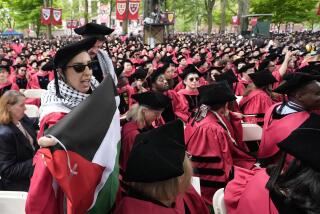Satanists anger Harvard’s Catholics with plans for ‘black mass’
No sympathy for the devil, indeed: Harvard and Boston-area Catholics are in an uproar over an independent student group’s plans to hold a Satanist ceremony Monday evening as part of an ongoing series of events exploring other cultures.
The Boston Catholic archdiocese, Harvard’s chaplains and even Harvard’s president have denounced the Harvard Extension Cultural Studies Club’s “black mass” event -- which is expected to resemble the traditional Christian ritual of communion -- as insensitive and offensive.
“It is deeply regrettable that the organizers of this event, well aware of the offense they are causing so many others, have chosen to proceed with a form of expression that is so flagrantly disrespectful and inflammatory,” Harvard President Drew Faust said in a statement echoing other officials’ criticisms, adding that she planned to attend a religious ceremony Monday evening to support campus Catholics.
But there’s at least one group who doesn’t see what all the fuss is about, and that’s the Satanists who will help put on the ceremony.
“I just think this ‘black mass’ reenactment is a non-story,” Lucien Greaves, spokesman for the New York-based Satanic Temple, said Monday.
The devil is big news right now, with Pope Francis delivering a homily last month in which he told followers, “The devil is present! The devil is here, even in the 21st century! And we mustn’t be naive, right? We must learn from the gospel how to fight against Satan.”
The Satanic Temple describes itself as a humanist group that uses Satan as a symbol of rejecting superstition, authority and organized religion, spokesman Greaves said.
The group has previously celebrated same-sex unions at the grave belonging to the mother of Westboro Baptist Church founder Fred Phelps and has asked for a monument to Satan on Oklahoma Capitol grounds.
Monday’s ceremony is expected to be held at the Cambridge Queen’s Head Pub and involve the reenactment of the Eucharistic Prayer, the most solemn part of the Mass in which Catholics believe that bread and wine are transformed into the body and blood of Christ.
Although university officials have condemned the event, they have not tried to stop it.
“It’s a declaration of personal independence for the people engaged in it,” Greaves said of the ceremony. “The Catholic Church is irrelevant to us. We don’t feel like we’re in direct conflict with them, because they don’t have meaning in our lives.
“We plan to talk about historical academic context,” Greaves added, criticizing religious officials’ “ridiculous, infantile fears that we’re actually going to summon the devil, or their great fears that we’re going to profane their magical bread. We’re not using a consecrated host or anything like that.”
In an unsigned statement emailed to the Los Angeles Times, the student group said it planned to carry out the event in the name of freedom of expression and tolerance despite enduring “coordinated attacks” via email and receiving “intimidating letters,” adding that hundreds of people had expressed interest in attending.
“People might find the rituals offensive to their sensibilities, but there is no expression of hate towards any group, and there is no incitement of violence,” the statement said.
“This ceremony does not silence any individuals from expressing their respective faiths as they see fit. No one is intimidated in such a way that they feel they cannot behave as they choose. Those who oppose this reenactment simply feel that their deeply held rituals are being mocked.”
In a statement, the Archdiocese of Boston announced an hour of prayer for participants in the black mass: “This activity separates people from God and the human community, it is contrary to charity and goodness, and it places participants dangerously close to destructive works of evil.”
“Just because something may be permissible does not make it right or good,” added the Harvard Chaplains, a group of campus chaplains representing different faiths, in its own statement.
“Whether or not these students are ‘entitled’ to express themselves through the ceremony of a ‘black mass’ as a matter of law or university policy is a distinct question from whether this is a healthy form of intellectual discourse or community life,” the group said. “We submit it is not.”
More to Read
Sign up for Essential California
The most important California stories and recommendations in your inbox every morning.
You may occasionally receive promotional content from the Los Angeles Times.











